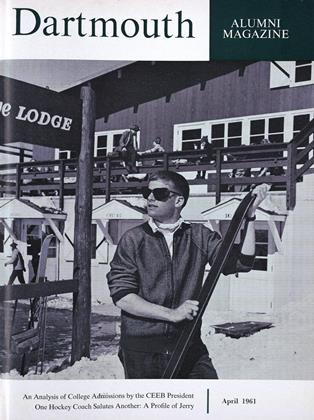By George W. Hilton '46. Cambridge: W. Heffer & Sons,1960. 166 pp. 21s.
The British truck system, says Professor George Hilton of Stanford's Economics Department, is "the name given to a set of closely related arrangements whereby some form of consumption is tied to the employment contract." That contract usually took the form of what in the United States is called the company store. Many an English coal miner had to buy his groceries at the company's store and at very high prices. He thus found his 25 shilling weekly wage reduced by 2 shillings. His fellow workers who received 25 shillings but could buy at competitive stores enjoyed a greater real wage. The truck system thus became an unpopular institution among the working classes.
In his study of the truck system Professor Hilton raises and answers four key questions: Why did such a system develop? What measures did Parliament take to end it? How effective were those measures? And were such measures justified?
His answer to the first question is judicious. He carefully assesses the various explanations of why firms adopted truck. He rejects the explanation that firms used it to tie workers to their jobs through the debts which workers incurred in their company stores. He also doubts that its value as a means of paying workers in times of currency shortage accounts for its widespread use. He prefers instead the explanation that firms adopted the system in order to reduce those standardized wages which guilds or unions had firmly established. This explanation, as Professor Hilton points out, does not hold for all trades which adopted truck but it does for a majority of them.
From 1465 to 1820 Parliament passed 20 acts against the truck system. In 1831 Parliament repealed all of those acts and passed one comprehensive act outlawing the truck system. That act is still today, despite some amendments, the law of the land.
Though the act of 1831 clearly declared truck illegal it nevertheless did not end that system. With no administrative officials to enforce it, with ludicrously light fines for violation of it, and with employees who took court action against it often fired, the law remained a dead letter. It fell to the Trade Unions and not to Parliament to end the truck system in the late nineteenth century.
Professor Hilton not only finds the truck acts administratively ineffective but according to economic theory unnecessary. Explicitly adopting David Ricardo's theory of the labor market he argues that workers who find the truck system harmful can hire on with employers who do not enforce it, thus making legislation against it unnecessary. Hilton shares Ricardo's assumption of a highly mobile labor market, one in which the laws, of supply and demand for workers would remove glaring injustices imposed by a particular employer. Given Ricardo's assumption the argument is persuasive. But there are many economists today who consider Ricardo's theory as anachronistic as inter-urban railways or Chicago cable cars, means of transportation about which Professor Hilton has written informative books. The Truck System is his third solid work and like the other two it is not without a romantic attachment to an anachronism or two.
 View Full Issue
View Full Issue
More From This Issue
-
 Feature
FeatureJERRY
April 1961 By RICHARD F. VAUGHAN -
 Feature
FeatureTwo Questions About Getting Into College
April 1961 By FRANK H. BOWLES -
 Feature
FeatureHanover Marks Its 200th Year
April 1961 By D.E.O. -
 Article
ArticleTHE FACULTY
April 1961 -
 Class Notes
Class Notes1956
April 1961 By STEWART SANDERS, TOM H. ROSENWALD -
 Class Notes
Class Notes1911
April 1961 By NATHANIEL G. BURLEIGH, JOSHUA B. CLARK
Books
-
 Books
BooksAlumni Articles
DECEMBER 1965 -
 Books
BooksABENAKI INDIAN LEGENDS, GRAMMAR AND PLACE NAMES.
December 1932 By E. P. K. -
 Books
BooksTREASURE MOUNTAIN,
December 1937 By Eric P., Herbert F. West '22. -
 Books
BooksSPARROW HAWKS
October 1950 By F. Cudworth Flint -
 Books
BooksA PRIVATE PARTY.
March 1954 By HENRY M. DARGAN -
 Books
BooksGEOCHEMISTRY OF BERYLLIUM AND GENETIC TYPES OF BERYLLIUM DEPOSITS.
OCTOBER 1966 By JOHN B. LYONS


